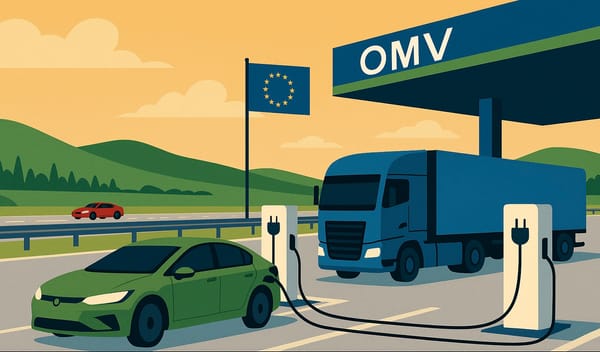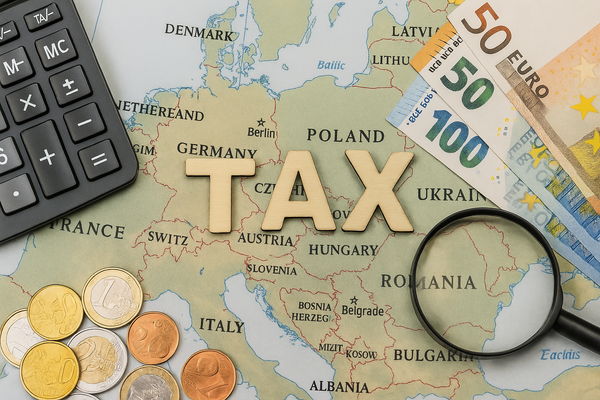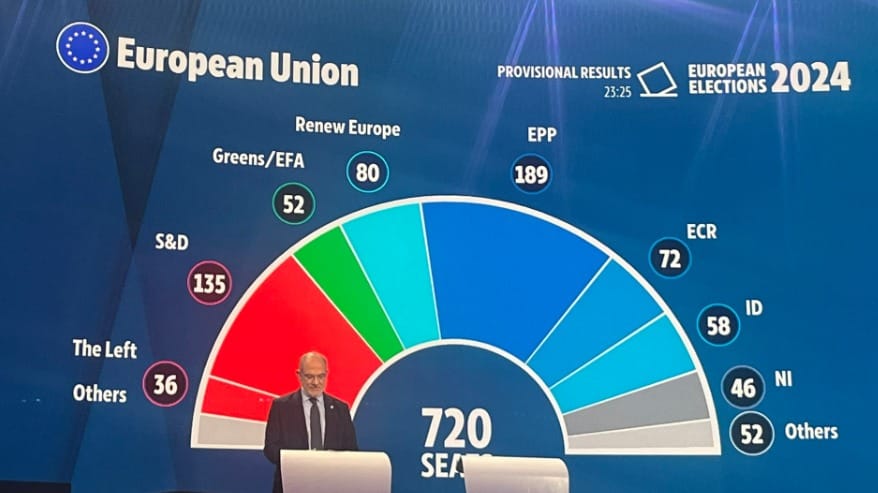
CEE centre holds, as far-right scores gains in EU vote
Pro-European centrist parties performed well in Central and Eastern Europe (CEE) at the European Parliament (EP) elections held from 6-9 June, in contrast to elsewhere on the continent, where far-right parties surged.
Tusk consolidates lead in Poland
In Poland, the Civic Coalition (KO), led by Prime Minister Donald Tusk, gained 37.4% of the votes, narrowly beating the right-wing nationalist Justice and Law (PiS) party (35.7%) into second place. Far-right Konfederacja won 11.8% of the votes, pro-Europe centre-right Trzecia Droga (Third Way) took 7.3% and the left-wing coalition Lewica 6.6%.
The result positions KO as the dominant political force in the country after a campaign that centred on security concerns. During the election drive, Tusk framed the vote as a choice between safety in the EU and a risky future outside of it. The former European Council president remains a staunch pro-European in contrast to PiS leader Jaroslaw Kaczynski, who criticised the EU in Warsaw on Sunday.
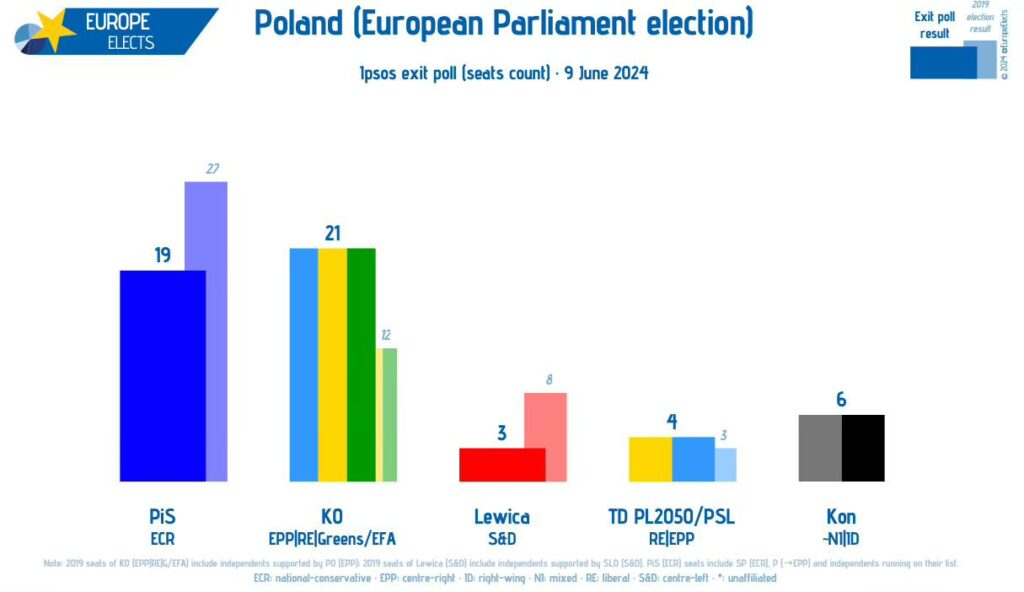
New contender emerges in Hungary
In Hungary, provisional results show that Fidesz-KDNP alliance secured the most votes, with 44.3%, whilst also suffering its worst result in nearly two decades. In power since 2010, Hungary’s ruling party will be concerned about the surging support for political newcomer Peter Magyar’s Tisza party, which garnered 29.95% of the vote. The centre-left coalition DK-MSZP-P coalition had a bad night, gaining just 8.2% of the vote, while far-right Mi Hazank garnered 6.74%, and will have one MEP in Brussels. Just missing out were liberal Momentum 3.65% and spoof political party MKKP 3.57%.
Magyar pledged to tackle corruption and restore democratic checks and balances, which critics argue have diminished under Orban’s leadership. At Tisza’s election night party, supporters chanted: “We are the future!” Magyar called the election the Fidesz government’s Waterloo and “the beginning of the end”, according to UK liberal daily The Guardian. Tisza will join the European People’s Party (EPP) group in the EP, Magyar revealed.
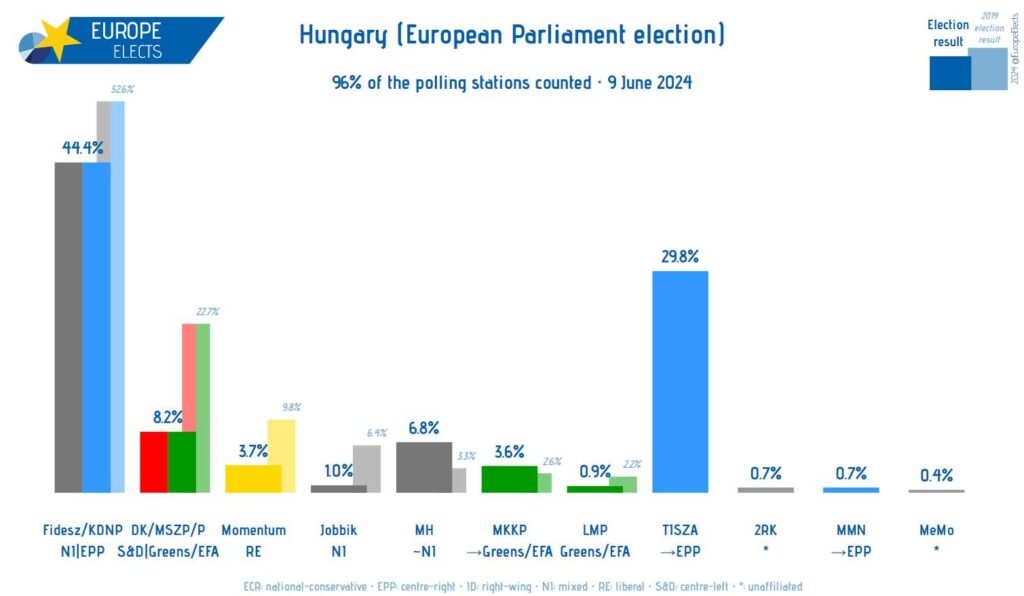
Slovak voters not swayed by Fico attack
Additionally, in Slovakia, the liberal and pro-Western opposition party Progressive Slovakia surpassed SMER-SD, the largest party in Prime Minister Robert Fico’s leftist-nationalist government, who survived an assassination attempt last month.
Progressive Slovakia (27.8%) beat Fico’s ruling Smer party (24.8%) into second place. Far-right Republika got 12.5% of the vote, social democratic Hlas 7.2%, and pro-Europe centre-right KDH 7.1%.
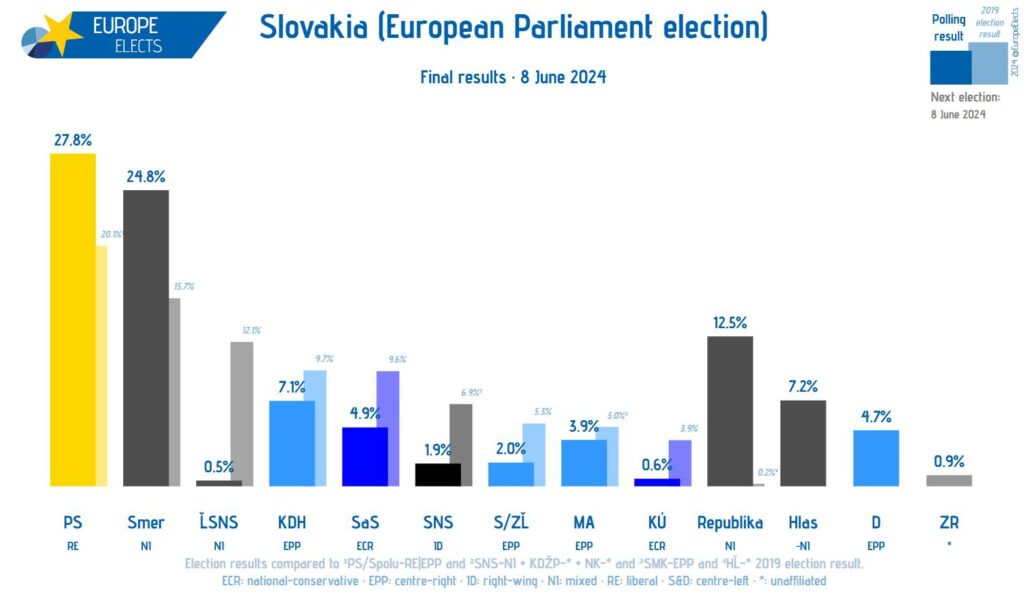
Far-right party places second in Romania
In Romania, the ruling coalition of leftist Social Democrats (PSD) and centre-right liberal PNL, running jointly, secured 53% in the EP elections. Meanwhile, far-right group AUR, founded 5 years ago and known for its opposition to immigration and military aid to Ukraine, ranked 2nd with 14% of the votes. The new centre-right alliance ADU placed 3rd with 11% of the vote.
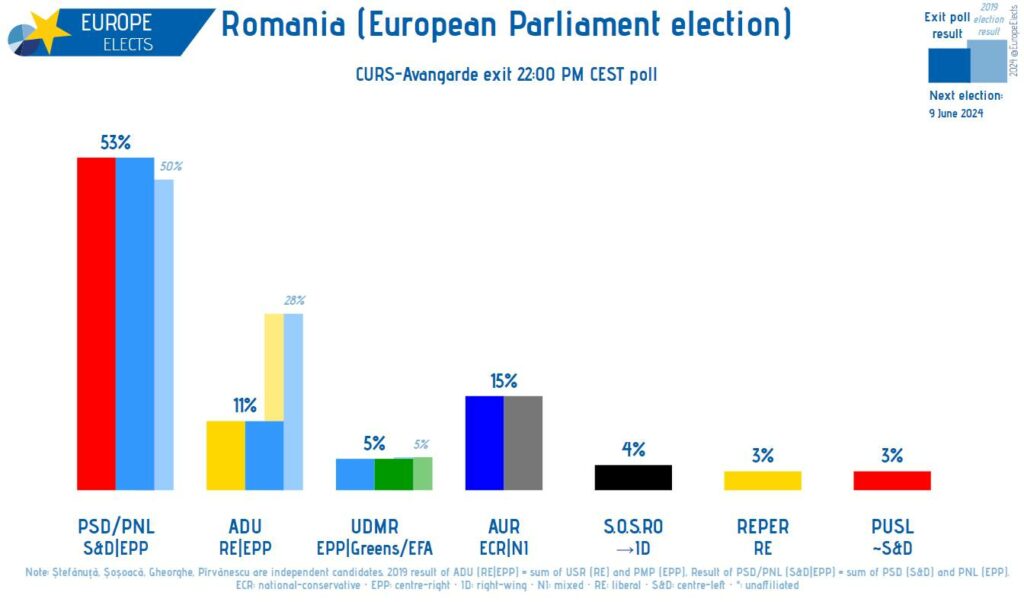
Babis bounces back in Czech vote
ANO 2011 won 26.14% of the votes in Czechia, indicating enduring support for former prime minister Andrej Babis’s party. The ruling SPOLU centre-right alliance secured 22.27%, according to preliminary data, hard-right Prisaha a Motoriste (Oath and Motorists) 10.26%, left-wing coalition Stacilo! (That’s enough!) 9.56%, and centre-right STAN-SLK 8.7%. The pro-Europe, green Pirate Party garnered 6.2% of the vote, while the Eurosceptic right-wing SPD a Trikolora received 5.73%.
Turnout exceeded 30% in many areas, compared to the 2019 country average of 28.7%. In Prague, turnout on the morning of the second voting day was slightly above 30%, compared to 39% total turnout in 2019, Europe Elects noted. In Brno, 30.5% of eligible voters had voted by the morning of the second voting day, up from 23% total turnout in 2019.
Overall picture likely to remain stable
In the western part of the EU, major political players suffered big defeats. French President Emmanuel Macron called a snap election after Marine Le Pen’s French National Assembly trounced his Renaissance (formerly En Marche) party. German Chancellor Olaf Scholz’s SDP was also soundly beaten into third place behind the conservative Christian Democratic Union/Christian Social Union CDU-CSU (30.2%) and the far-right Alternative for Deutschland (AfD), which received 16% of the votes, up 5 percentage points from 2019. The SDP garnered just 13.9% of the vote, its worst ever performance in a national election.
Nevertheless, pro-European parties will retain a comfortable majority in the EP from 2024-29, as a coalition of four centrist parties is expected to secure well over 400 of the 720 MEPs in the legislature responsible for EU law deliberation for the next five years.
However there is no guarantee of a second term for European Commission President Ursula von der Leyen, although the strong performance of the EPP could bolster her chances, especially after she campaigned as its lead candidate.
As well as the EPP, von der Leyen has previously relied on support from greens, liberals and socialists. However, as the greens and liberals each shed some 20 MEPs, achieving the necessary majority will be challenging.
“The centre is holding, but it is also true that the extremes on the left and on the right have gained support,” said von der Leyen, adding that her centre-right group was an “anchor of stability”, but the result would necessitate “great responsibility for the parties in the centre”.

